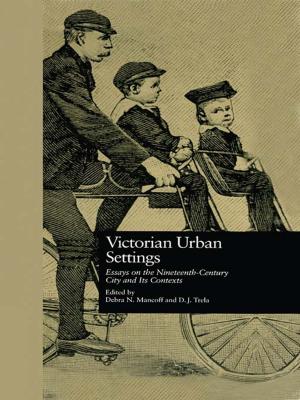Privacy, Domesticity, and Women in Early Modern England
Fiction & Literature, Literary Theory & Criticism| Author: | ISBN: | 9781351908740 | |
| Publisher: | Taylor and Francis | Publication: | May 15, 2017 |
| Imprint: | Routledge | Language: | English |
| Author: | |
| ISBN: | 9781351908740 |
| Publisher: | Taylor and Francis |
| Publication: | May 15, 2017 |
| Imprint: | Routledge |
| Language: | English |
The ten essays in this collection explore the discrete yet overlapping female spaces of privacy and domesticity in early modern England. While other literary critics have focused their studies of female privacy on widows, witches, female recusants and criminals, the contributors to this collection propose that the early modern subculture of femaleness is more expansive and formative than is typically understood. They maintain that the subculture includes segregated, sometimes secluded, domestic places for primarily female activities like nursing, sewing, cooking, and caring for children and the sick. It also includes hidden psychological realms of privacy, organized by women's personal habits, around intimate friendships or kinship, and behind institutional powerlessness. The texts discussed in the volume include plays not only by Shakespeare but also Ford, Wroth, Marvell, Spenser and Cavendish, among others. Through the lens of literature, contributors consider the unstructured, fluid quality of much everyday female experience as well as the dimensions, symbols, and the ever-changing politics and culture of the household. They analyze the complex habits of female settings-the verbal, spatial, and affective strategies of early-modern women's culture, including private rituals, domestic practices, and erotic attachments-in order to provide a broader picture of female culture and of female authority. The authors argue-through a range of critical approaches that include feminist, historical, and psychoanalytic-that early modern women often transformed their confinement into something useful and necessary, creating protected and even sacred spaces with their own symbols and aesthetic.
The ten essays in this collection explore the discrete yet overlapping female spaces of privacy and domesticity in early modern England. While other literary critics have focused their studies of female privacy on widows, witches, female recusants and criminals, the contributors to this collection propose that the early modern subculture of femaleness is more expansive and formative than is typically understood. They maintain that the subculture includes segregated, sometimes secluded, domestic places for primarily female activities like nursing, sewing, cooking, and caring for children and the sick. It also includes hidden psychological realms of privacy, organized by women's personal habits, around intimate friendships or kinship, and behind institutional powerlessness. The texts discussed in the volume include plays not only by Shakespeare but also Ford, Wroth, Marvell, Spenser and Cavendish, among others. Through the lens of literature, contributors consider the unstructured, fluid quality of much everyday female experience as well as the dimensions, symbols, and the ever-changing politics and culture of the household. They analyze the complex habits of female settings-the verbal, spatial, and affective strategies of early-modern women's culture, including private rituals, domestic practices, and erotic attachments-in order to provide a broader picture of female culture and of female authority. The authors argue-through a range of critical approaches that include feminist, historical, and psychoanalytic-that early modern women often transformed their confinement into something useful and necessary, creating protected and even sacred spaces with their own symbols and aesthetic.















